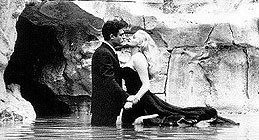|
|
|
|
La
Dolce Vita
|
 |
|
Federico Fellini's La Dolce Vita had a warm reception when it was re-released – in glorious TotalScope – at the close of the '80s. Its new-found cult potential is obvious. In an age of obsessive retro style which is especially consumed by a fantasy of '60s cool, this film has it all: the sunglasses, jazz and rock, cars, clothes. But like another successful re-release from the same period, Jean-Luc Godard's À bout de souffle (1960), La Dolce Vita strikes a deeper note of familiarity with contemporary audiences. Although people often seem to think that postmodernism is the great, incomprehensible artistic/intellectual fad of the '80s and '90s, I can think of no better primer in the postmodern sensibility than this film by Fellini. Early '60s cinema – in Italy and Poland, as well as the French Nouvelle Vague – indeed previewed many cultural currents to come. For instance, the cry of a poet in La Dolce Vita – "the great thing is to burn, and not to freeze" – irresistibly anticipates, by around twenty years, born-again punk rocker Neil Young's slogan: "It's better to burn out than to fade away". What La Dolce Vita most resembles, however, is Brett Easton Ellis' Less Than Zero and other late-'80s novels of its ilk. In both cultural moments, we have the portrait of a bored, overstimulated middle class, rejecting the moral code of its elders, but able to replace it with only a soft, alienated cruise into oblivion. In both the '60s and '80s, society runs on media hype, instant and empty celebrity, and incessant, dizzying social mobility. And where the soundtrack of Metropolitan Hell in an apocalyptic '80s movie like Herzog's Where the Green Ants Dream (1984) is "My Baby Does the Hanky Panky", in Fellini's 1960 it's a sweating, Italian singer in a black skivvy belting out, in broken English, Little Richard's "I'm Ready-Ready-Ready to Rock'n'Roll". The Mad Western World depicted by Fellini already enacts, down to the last detail, the hyper-eclectic "zero degree of contemporary culture" described twenty-one years later by philosopher Jean-François Lyotard in his essay "Reply to the Question: What is the Postmodern?":
But the most striking point of commonality between La Dolce Vita and Less Than Zero is that both, finally, are rather nostalgic – and quietly but surely moralistic (as, indeed, is Lyotard). Both Fellini and Ellis present the fragments or ruins of a broken world, and dream wistfully of a time when the pieces were once all together. A case in point: sex may be everywhere in La Dolce Vita, but it certainly doesn't seem like much fun. Yet, as Sam Rohdie has pointed out, all Fellini's films run on a rich paradox. He flagrantly condemns the illusions, corruptions and empty dreams of the modern world, yet his own style boundlessly celebrates artifice, fantasy and a merry loss of meaning. Corruption has a bittersweet taste – ultimately more sweet than bitter. But by the time of Ginger and Fred (1986), this tension which is at the heart of Fellini's best films has gone rather slack, and the thundering anti-modernity moralism has well and truly trumped the let's-party spirit. La Dolce Vita is a film stuffed with engaging paradoxes like these. It is long and sometimes trying but, as Geoffrey Nowell-Smith once commented: "[A]s a film about the difficulties of living, of making sense of living, and of making a narrative as way of making sense of living, it has a certain depth and even grandeur." (2) It is certainly a highpoint of the great, canonical art-film tradition as we came to know it until the World Cinema revolutions of the '90s. MORE Fellini: Amarcord, Juliet of the Spirits, La Strada, Orchestra Rehearsal © Adrian Martin April 1991 1. Critique no. 419, April 1981. back 2. Monthly Film Bulletin, no. 645, October 1987. |
![]()